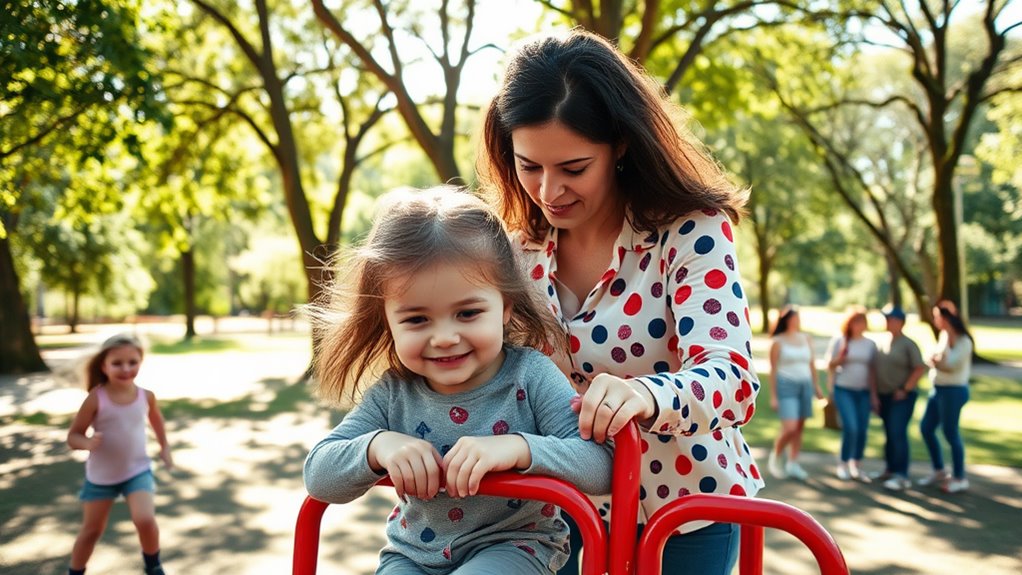The Pros and Cons of Helicopter Parenting
Helicopter parenting means you’re closely monitoring and controlling your child’s activities, which can have both upsides and downsides. On the plus side, it offers strong support, helps kids tackle challenges, and can build family bonds. However, it might also stifle your child’s independence and create feelings of inadequacy. Kids may struggle to develop problem-solving skills when constantly bailed out. Additionally, helicopter parenting can strain relationships, making children feel smothered or resentful. It is crucial to strike a balance between guiding your child and giving them space to grow independently, and there’s more to explore about this important parenting style.
Definition of Helicopter Parenting

Helicopter parenting refers to a style of raising children where parents are overly involved in their kids’ lives, often hovering closely to monitor every action and decision. You might notice these parents constantly checking in, attending every school event, and even helping with homework in a way that makes it hard for kids to tackle challenges independently.
This parenting approach stems from a place of love and concern, as these parents want the best for their children. However, it can create an environment where kids feel smothered. You might find that some children start to rely heavily on their parents for guidance, making it tough for them to develop problem-solving skills or learn from their mistakes.
Helicopter parenting can also lead to heightened anxiety in children. When they know their every move is being watched, they may worry more about making mistakes or disappointing their parents.
This pressure can impact their self-esteem and willingness to try new things. Ultimately, while the intention behind helicopter parenting is often positive, it can create challenges for kids as they grow and learn to navigate the world on their own.
Advantages of Helicopter Parenting

One of the key advantages of this parenting style is the strong support system it provides for children. As a helicopter parent, you’re always there to guide and encourage your child, which can boost their confidence. When kids know you’re right there to support them, they often feel more secure in taking risks, whether it’s trying out for a team or tackling a challenging school project.
Another benefit is that you can help them navigate difficult situations. With your involvement, your child can develop essential skills, like problem-solving and decision-making, which are vital for their future. You also have the opportunity to instill values and lessons that will stick with them throughout their lives.
Moreover, helicopter parenting can lead to stronger family bonds. By being actively involved in their lives, you create a sense of closeness and trust that makes it easier for your child to open up about their feelings and challenges.
In this fast-paced world, having a parent who’s engaged can make all the difference.
Disadvantages of Helicopter Parenting

While the support of a helicopter parent can be comforting, it often stifles a child’s independence and confidence. When you constantly step in to solve problems for your child, they might struggle to learn how to handle challenges on their own. This can lead to feelings of inadequacy, as they may believe they can’t succeed without your help.
Furthermore, helicopter parenting can create a sense of entitlement. Your child may start to expect assistance in all areas of life, making it harder for them to take initiative or be responsible. This reliance can also affect their decision-making skills, as they might hesitate to make choices without your input.
Additionally, helicopter parenting can lead to increased stress for both you and your child. You may feel pressured to guarantee their success, while they may feel overwhelmed by your expectations. The constant monitoring can strain your relationship and create resentment, making it difficult for your child to express their feelings or opinions.
In the long run, stepping back and allowing your child to navigate their own experiences can foster a healthier, more balanced relationship, promoting their growth and self-esteem.
Impact on Child Development

The reliance on helicopter parenting can considerably shape a child’s development. When parents constantly hover over their kids, it may lead to a sense of dependency. You might notice that your child struggles to solve problems on their own or hesitates to take risks. This can hinder their ability to develop essential life skills, like decision-making and resilience.
Moreover, children raised this way may find it difficult to cope with challenges. They often lack the confidence needed to face obstacles independently, which can impact their self-esteem. Instead of learning from mistakes, they might expect parental intervention at every turn.
On the flip side, some argue that helicopter parenting can provide a strong support system, guiding children through the complexities of life. However, the key is to strike a balance. Encouraging independence while offering guidance helps foster a sense of autonomy.
Ultimately, a child’s development thrives when they’re allowed to explore, make mistakes, and learn from their experiences. By stepping back occasionally, you can give your child the opportunity to grow into a confident, self-sufficient individual ready to tackle the world.
Effects on Parent-Child Relationships

Helicopter parenting can considerably affect parent-child relationships, often leading to strained dynamics. When parents hover too closely, children might feel smothered, which can create resentment.
You may find that your child struggles to express their feelings or independence, fearing your reaction or judgment. This constant oversight can erode trust, as kids may believe you don’t think they can handle their own lives.
On the flip side, a strong bond can develop if you encourage open communication. It’s important to strike a balance between guidance and freedom.
